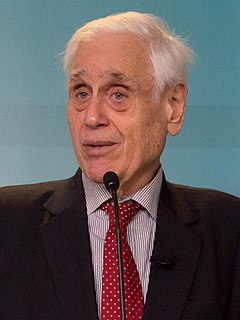Top 14 Quotes & Sayings by Edward Jay Epstein
Explore popular quotes and sayings by an American journalist Edward Jay Epstein.
Last updated on December 21, 2024.
In the first week of the showings of the The Matrix Revolutions, The Godfather and The Godfather Part II played on cable television. I started watching, and I was held; I wanted to go through the process again. Can anyone credit that 30 years from now there will be an audience for the three parts of The Matrix, anywhere? Even if Keanu Reeves is our president by then?
I understand the feelings of critics asked to come up with the ten best films of any year, who say, Ten? Ten's a lot! - and those more generous spirits whose thumbs grow as long as Pinocchio's nose from overrating a lot of pictures, because they want the medium to do well, and because they'd like to feel good about it.
The capacity for loving strangers, whether one thinks of them as fictional beings or stars one will never meet, is a profound reflection on the new consciousness whereby every individual leads his or life while aware of all the billions of other people on Earth. Perhaps it is a fantasy or a fallacy that we can feel for so many strangers. Perhaps it is a mask for selfishness. But no matter the modern stress on special effects, there isn't a sight in movies as momentous as shots of a face as its mind is being changed. And only movies have allowed that.
I dislike The Exorcist, and I found it a warning sign of the dangers in a furious cinematic talent putting the audience through it (a Hitchcock phrase) without purpose, or without the nagging moral anxiety that activated Hitch. You see, I don't think William Friedkin believes in the Devil, or cares about him. I think he found exorcism a pretext for a gross-out and he calculated there was an audience for it, or a crowd ready to be challenged. Maybe I'm too much of an atheist to stand religion being so thrashed.
What guided Chaplin was the proper protection of self-interest (or craziness). So Chapling, Douglas Fairbanks, and Mark Pickford, with DW Griffith and William S Hart, made an alliance, called United Artists, whereby they would own a distribution company that would market their pictures, allowing them a greater return than if they leased the movies to some outside distributor.
Louis B. Mayer is one of those with a claim to posessing the equation... he began to buy up nickelodeon arcades in the years before the First World War in and around Boston. He had noticed that people liked going into the dark to see the light... the appeal of the movies is beyond the sensible, rational or the hard-working. Going into the dark, afte centuries of progress in which mankind has staggered toward artificial light, smacks of delicious perversity.
The problem of journalism is simple. Journalists are rarely in a position to establish the truth of an issue themselves, since they didn't' witness it personally. They are entirely dependent on self-interested sources to supply their facts. Every part of the news-making process is defined by this relationship; everything is colored by this reality.

















